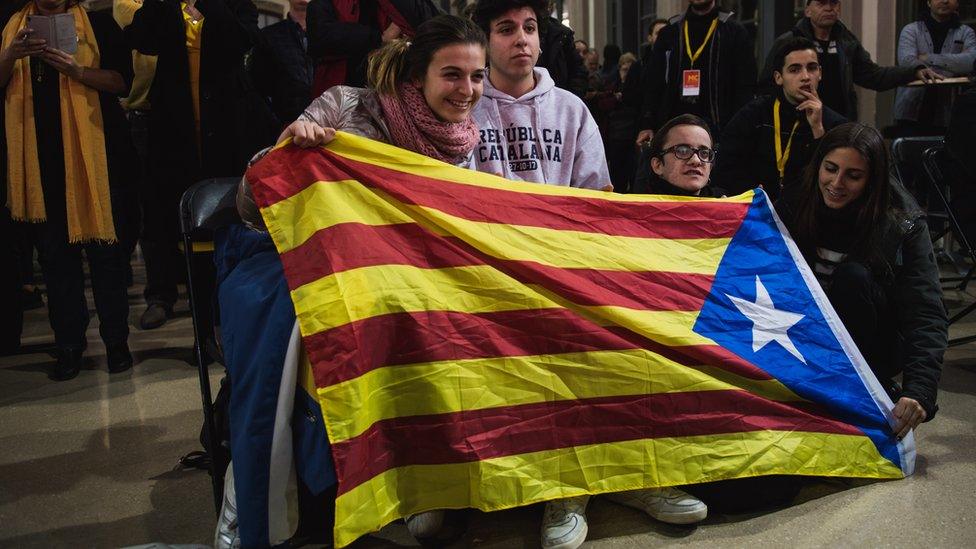Spanish election: Five face off in race to run Spain
- Published
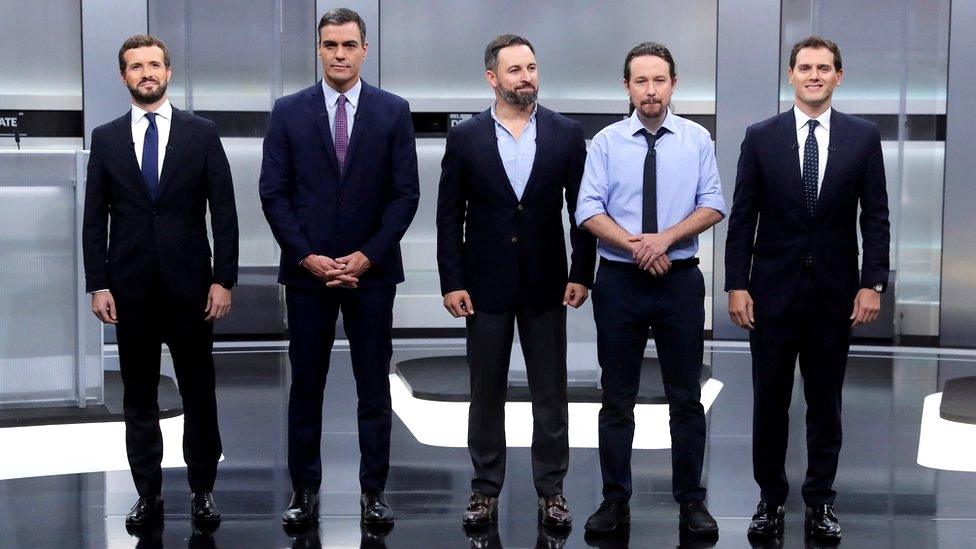
(L-R): Pablo Casado, Pedro Sánchez, Santiago Abascal, Pablo Iglesias and Albert Rivera
Spain has held another inconclusive general election - its second since April and fourth in four years.
Acting Prime Minister Pedro Sánchez, whose Socialists have gained the most seats, announced the vote in September after failing to secure enough parliamentary support to form a government.
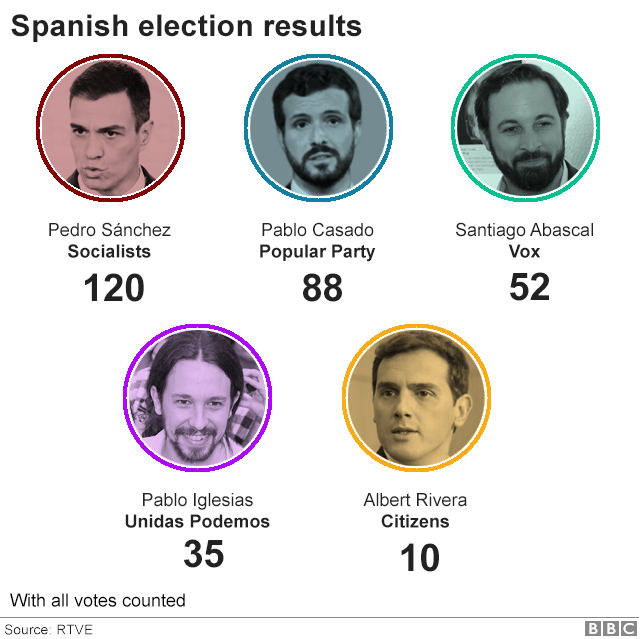
After months of fractious negotiations and political turmoil, Spaniards had hoped to break the political gridlock.
Here we look at the leaders of the main national political parties and what they represent.

We are going to add a new felony to the criminal code that forbids, once and for all, the celebration of illegal referendums in Catalonia.
Pedro Sánchez, 47, is arguably at an advantage in his current position as caretaker prime minister, even though he has never yet won a parliamentary majority.
His tenure began with the fall of the conservative Popular Party in a June 2018 no-confidence vote. Since then the Socialist (PSOE) leader has implemented a series of eye-catching measures that appealed to his base, such as raising the minimum wage and appointing a female-dominated cabinet.
He wants more ambitious, structural reforms; he has talked about plans to overhaul the education system, legalise euthanasia, change labour regulations and shake up national broadcaster RTVE.
He has also sought to lower tensions with Catalonia, Spain's semi-autonomous north-eastern region whose failed bid for independence in 2017 sparked the country's biggest political crisis for 40 years.
Mr Sánchez is opposed to another independence referendum, but has previously recognised Catalonia and the Basque Country to be nations within Spain, not just regions.

I want to lead a government that protects the elderly... and encourages youngsters to achieve their dreams.
Elected leader of the Popular Party (PP) in July last year, Pablo Casado's appointment was seen as a shift to the right for Spain's main opposition.
The 38-year-old, who wants to lower income and corporation taxes for Spaniards in an effort to boost productivity, has called for revisions in the European Union's freedom of movement and border policies.
Mr Casado, who previously served as the PP's communications chief, took control of the party after it was implicated in a corruption scandal that led to the ousting of former Prime Minister Mariano Rajoy.
He has consistently taken a hardline stance on Catalan separatists and has previously labelled Mr Sánchez "the biggest villain in Spain's democratic history" for holding talks with Catalan President Quim Torra.

We would suspend the autonomy in Catalonia and take control of the region's media, police and education.
A former PP member, Santiago Abascal now leads Vox, a party that has seen its support rapidly grow.
Vox's success was seen as a turning point for the far right, who had not won seats in parliament since the death of Spanish dictator Francisco Franco in 1975 and the restoration of democracy (with the sole exception of a single seat in the first parliament of 1979-1982).
While Mr Abascal rejects the far-right label, the party's views on immigration and Islam place it in line with far-right and populist parties elsewhere in Europe.
Vox has a plan to deport migrants legally entitled to be in Spain if they have committed an offence, and wants to prevent any migrant who comes in illegally from staying.
Who are Spain's far-right party?
The party also wants to repeal laws against gender violence, and opposes abortion and same-sex marriage. Critics see it as a nationalist throwback to the Franco era.

We should not be intimidated by the ignorant and violent right wing that says there is no such a thing as a plurinational country.
Pablo Iglesias, 41, leads the left-wing Podemos (We Can) party, whose anti-austerity policies focus on investing in public services such as education and health and protecting social rights.
He formed Podemos in January 2014 with a group of fellow left-wing university lecturers.
Mr Iglesias was a member of Spain's Communist Youth Union and was part of the anti-globalisation movement in the 1990s. He survived a Podemos confidence vote last May after controversially spending €600,000 (£527,000; $700,000) on a luxury home.
Some rank-and-file Podemos members said purchasing the property, which included a swimming pool and guest quarters, undermined the party's grassroots credibility.
Ahead of Sunday's election, Mr Iglesias said that he would work with Mr Sánchez to form a government that would focus on progressive policies if no single party secured a majority.
Along with leading his party, Mr Iglesias presents talk shows on Spanish television and is a lecturer in political science.

I am the only candidate that has vowed to negotiate reforms and agreements with the parties that support the constitution in order to get Spain on track.
Albert Rivera, who turns 40 next week, launched his Ciudadanos (or Citizens) party in 2006 handing out campaign posters in which he appeared naked.
Selling itself as socially liberal, Ciudadanos is committed to free market economics. Although it veered to the right before the April elections it pitched for the centre ground in the November vote and saw its support plummet, coming sixth with fewer seats than Catalonia's pro-independence ERC party.
Ciudadanos had risen to prominence in Catalonia with a campaign against independence.
More recently, Mr Rivera has said he would have dealt with the Catalan crisis by permanently suspending the region's autonomy and removing Mr Torra from office.
He has said he will play his part to help break the deadlock.
In the run-up to the election, Mr Rivera urged younger Spaniards to vote with "enthusiasm". His social media feed featured videos and messages apparently endorsed by his "secret weapon" - a dog named Lucas. In this post he welcomes the dog as "already part of the Citizens family".
Allow X content?
This article contains content provided by X. We ask for your permission before anything is loaded, as they may be using cookies and other technologies. You may want to read X’s cookie policy, external and privacy policy, external before accepting. To view this content choose ‘accept and continue’.

Seats won in April 2019
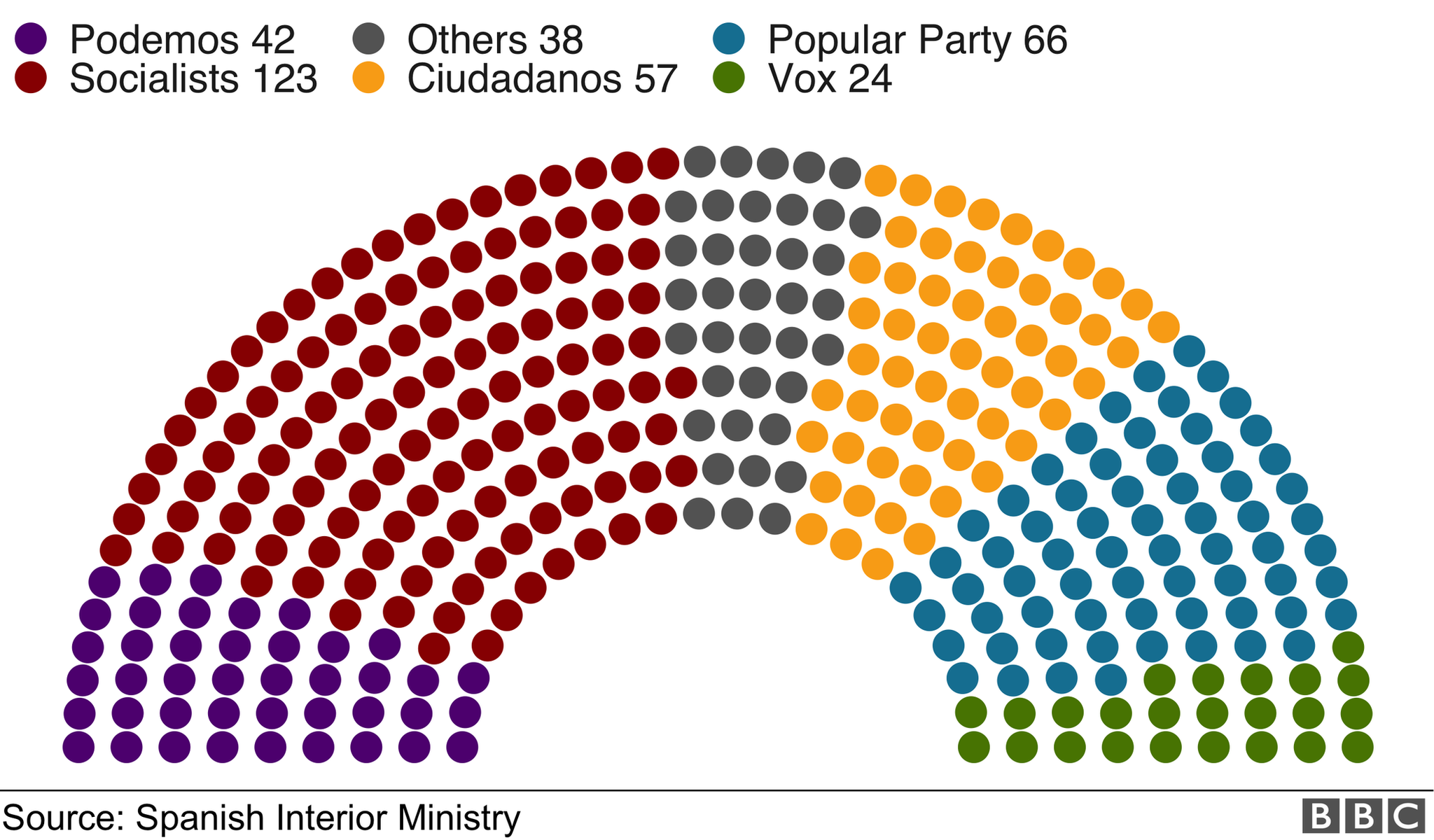
- Published7 January 2020
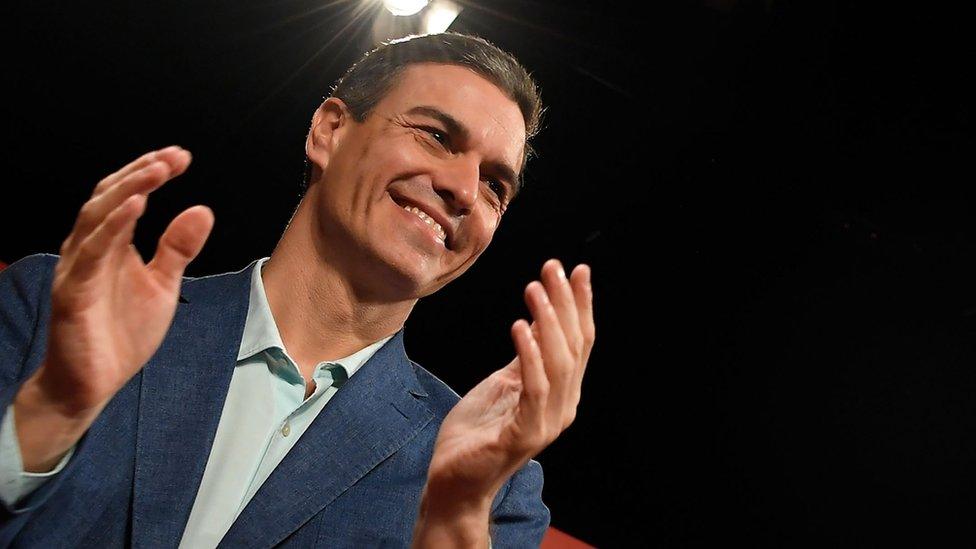
- Published14 October 2019
